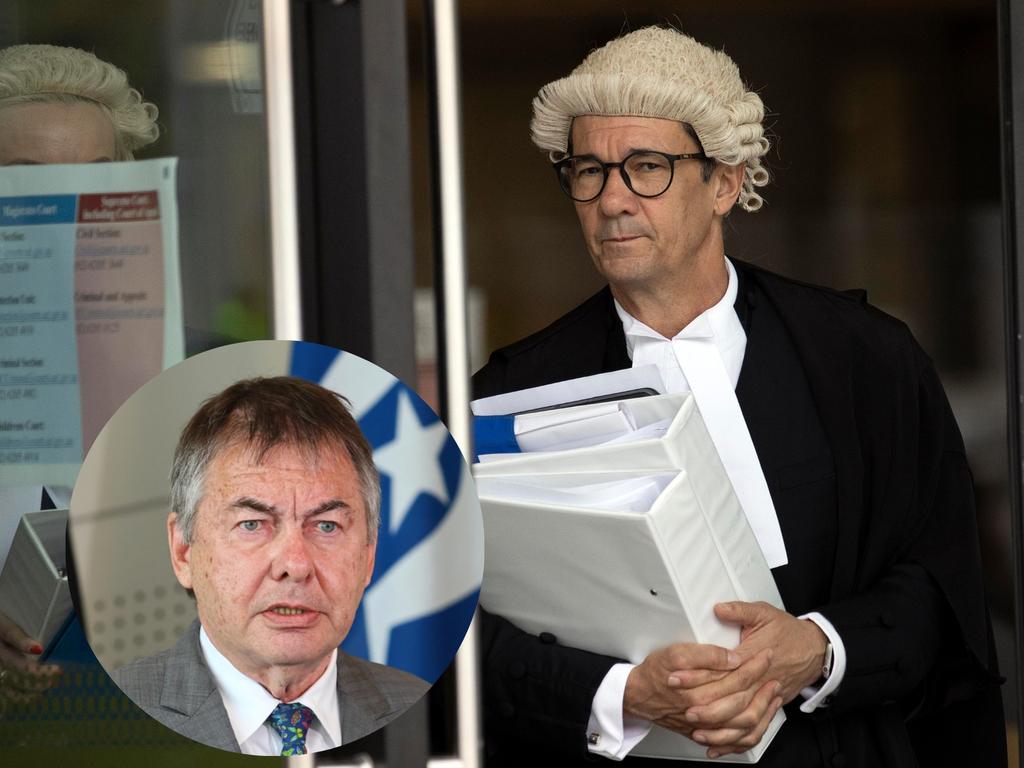Walter Sofronoff beats Integrity Commission’s privilege protection claims
The judge will be able to contest a report calling him ‘significantly compromised’, after a court rejected claims by the ACT Integrity Commission that it was protected by parliamentary privilege.

Walter Sofronoff KC will be allowed to fight the findings of a corruption probe into his investigation of the criminal prosecution of Bruce Lehrmann despite the ACT government arguing the report should be protected by parliamentary privilege.
Judge Wendy Abraham on Wednesday indicated she had not been convinced that the tabling of the ACT Integrity Commission’s report in the territory parliament was sufficient to grant it parliamentary privilege and therefore make it immune to judicial review.
Mr Sofronoff, a former Queensland solicitor-general, is seeking a judicial review in the Federal Court of the findings from the Commission’s probe of his investigation into former ACT Director of Public Prosecutions Shane Drumgold’s handling of Mr Lehrmann’s criminal trial for the alleged rape of Brittany Higgins.
“Having considered the material and the submissions made, I am not satisfied that the conduct of the proceedings on the material on which the applicant seeks to rely involves an infringement of … the Parliamentary Privileges Act,” Justice Abraham said.
“I’ll provide reasons for that conclusion in my final judgment.”
The judicial review will continue on July 21 and 22.
Solicitor Alison Hammond appeared on behalf of ACT Legislative Assembly Speaker Mark Parton in May as a ‘friend of the court’ to provide legal advice on the handling of parliamentary privilege and backed in lawyers for the Commission who argued their findings should be unimpeachable once handed up to the ACT Speaker.
Scott Robertson SC, acting for the Commission, said continuing the matter in the Federal Court would “amount to calling into question or impeaching proceedings in parliament”.
“It’s no business of the commission to positively seek to avoid its reports being the subject of scrutiny,” he said. “It is the business of the commission … to ensure that the privileges of the parliament are protected.”

Adam Pomeranke KC, acting for Mr Sofronoff, disputed this. He argued the report was not the product of parliamentary business despite being tabled in the Legislative Assembly and therefore should not receive parliamentary privilege.
“The mere tabling of a document in parliament, disconnected from any existing business of the house, or a committee, is not part of transacting the business of the house, or committee,” Mr Pomeranke said.
“It is natural to recoil against the suggestion that a report like the present report, which contains admitted errors of a serious crime, cannot be the subject of judicial address.”
Mr Pomeranke also argued broad brush parliamentary privilege protections on commission findings could raise “principle of legality questions” that teetered on the brink of a constitutional violation.
The ACT Integrity Commission began investigating Mr Sofronoff in May 2024 and tabled its 130-page report to the ACT Legislative Assembly in March.
The commission found Mr Sofronoff’s disclosure of confidential documents to journalists during the inquiry damaged its integrity and could possibly constitute a criminal offence, saying he was “significantly compromised” and became a “fellow traveller” with journalist for The Australian Janet Albrechtsen due to their repeated correspondence.
The commission found the disclosure of the report to journalists and sharing witness statements, report drafts and notices of adverse findings to Albrechtsen could constitute a criminal offence under the Inquiries Act.
Mr Sofronoff filed his Federal Court application in March, arguing the commission’s findings were “seriously illogical, irrational and/or unreasonable” on multiple counts and its report was riddled with jurisdictional error.
His application asserted it was his “unchallenged evidence … that he subjectively considered that it was necessary or convenient for the fair and prompt conduct of the inquiry for him to engage with journalists”, and he had no obligation of procedural fairness towards ACT Chief Minister Andrew Barr.
The Integrity Commission probe was launched after acting ACT Supreme Court judge Stephen Kaye last year found Mr Sofronoff’s behaviour during the inquiry gave rise to a “reasonable apprehension of bias”. However, he upheld the majority of Mr Sofronoff’s findings against Mr Drumgold.





